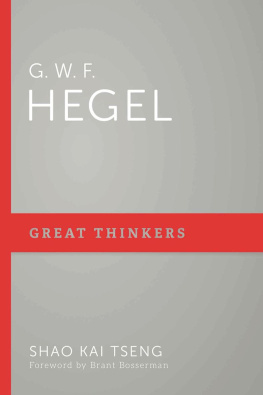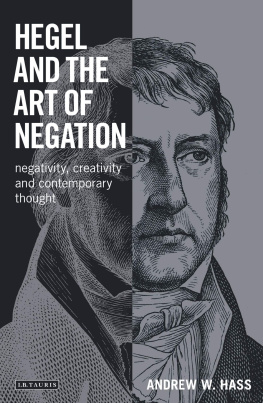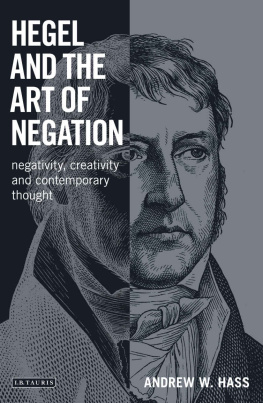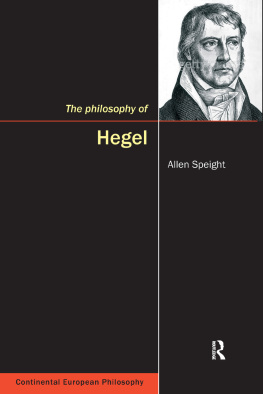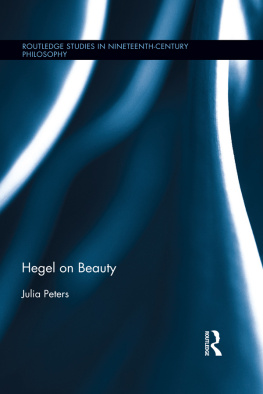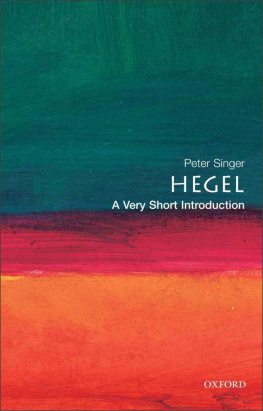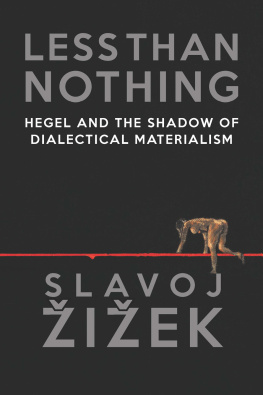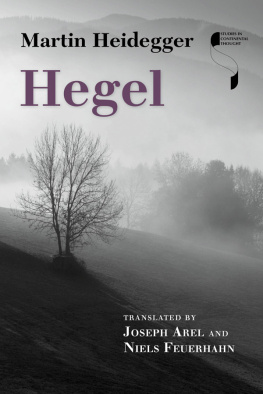A NEO-HEGELIAN THEOLOGY
A Neo-Hegelian Theology
The God of Greatest Hospitality
ANDREW SHANKS
Canon Theologian, Manchester Cathedral, UK
ASHGATE
Andrew Shanks 2014
All rights reserved. No part of this publication may be reproduced, stored in a retrieval system or transmitted in any form or by any means, electronic, mechanical, photocopying, recording or otherwise without the prior permission of the publisher.
Andrew Shanks has asserted his right under the Copyright, Designs and Patents Act, 1988, to be identified as the author of this work.
Published by
Ashgate Publishing Limited
Wey Court East
Union Road
Farnham
Surrey, GU9 7PT
England
Ashgate Publishing Company
110 Cherry Street
Suite 3-1
Burlington
VT 05401-3818
USA
www.ashgate.com
British Library Cataloguing in Publication Data
A catalogue record for this book is available from the British Library
The Library of Congress has cataloged the printed edition as follows:
Shanks, Andrew, 1954
A neo-Hegelian theology : the God of greatest hospitality / by Andrew Shanks.
pages cm
Includes bibliographical references and index.
ISBN 978-1-4724-1087-0 (hardcover: alk. paper)ISBN 978-1-4724-1088-7 (ebook)ISBN 978-1-4724-1089-4 (epub)
1. Philosophy and religion. 2. Hegel, Georg Wilhelm Friedrich, 17701831. 3. Trinity. I. Title.
BR100.S39 2014
230dc23
013020867
ISBN 9781472410870 (hbk)
ISBN 9781472410887 (ebk-PDF)
ISBN 9781472410894 (ebk-ePUB)
Contents
Introduction
Die List der Vernunft
By what sort of method, in general, does divine revelation proceed? Or how does the truth of faith emerge? G.W.F. Hegel, in his Science of Logic, outlines two basic alternatives: by violence or by cunning. In the first case,
That the end [think: Gods revelatory will] relates itself immediately to an object [the mind of a prophet or an apostle] and makes it a means, as also that through this means it determines another object [the mind of the larger witness-community], may be regarded as violence in so far as the end appears to be of quite another nature than the object, and the two objects similarly are mutually independent totalities.
Here, in the violent form of revelation, there are thus three quite distinct entities involved. The end and the two objects are three separate minds: the mind of God, the mind of the prophet or apostle, and the mind of the community. And the relationship between them is simple. Without any apparent ambiguity, it is the interplay of a primary agency, an instrument, and a passive material. But, in the second case,
that the end [Gods revelatory will] posits itself in a mediate relation with the object [the mind, in this case, of a preferably philosophic interpreter] and interposes another object between itself and it, may be regarded as the cunning of reason.
What is interposed between God and the interpreter, in the work of this cunning, is by contrast a whole historic process, which considered in itself is highly ambiguous: potentially a revelation of Gods truth, but not in an immediately obvious way; and therefore requiring considerable work of discernment, on the part of the interpreter, to be recognised for what it is. So the divine Revealer interposes a whole medium of teleological ambiguity, within which the truth of revelation is cunningly, so far as possible, slipped past the conservative resistances of sinful human instinct.
Hegels formulation is (beautifully!) abstract. But his reference to the cunning of reason in German, die List der Vernunft nevertheless makes it clear that his primary concern is with processes of divine revelation, since for him that is what reason is. He sees revelation everywhere, in the progress of reason; he stands absolutely opposed to any mere opposition between faith and reason.
Classical notions of divine revelation the revelation, for instance, which is delivered to Moses on Mount Sinai, to the later Hebrew prophets, to the authors of the New Testament, or to the Prophet Muhammad all of course conform to the first of these two models, the violent one. God seizes, one might well say violently, upon the prophet, or the apostle, as the immediate instrument of revelation. As a philosopher, however, Hegel himself is primarily concerned with the second model. That is to say, he seeks to discern another, much less direct and therefore altogether slower, unfolding of divine truth, immanent within secular historical developments as well as more overtly religious ones. He is interested, so to speak, in Gods gentle opportunism.
Clearly, it is in the nature of revealed religion that its traditions tend to originate in great volcanic eruptions of fresh insight, which are, to begin with, understood in classic, violent terms, even though they may, in actual fact, be altogether more morally ambiguous than such an understanding would suggest. This way of thinking is indeed what necessarily belongs to the initial breakthrough moments of any such tradition. And yet, it has intrinsic drawbacks. When the tradition in question cools, and sets hard, the violent model of revelation which tends to conceal rather than highlight the ambiguities involved all too often mutates into a mere rigid fundamentalism. Thus, fundamentalist theology as such essentially excludes any possibility of divine truth ever emerging any other way, apart from the violence of the initial eruption. Such thinking is the preservation, but also the corruption, of that violence: transforming it from the violent assault on traditional moral prejudices which was its original truth, into a more or less violent assault, now, on dissident thoughtfulness instead. Fundamentalist religion tends to corrupt the original creative violence of eruptive revelation into a justification for persecutory violence; whilst also drawing down the persecutory counter-violence of fundamentalist irreligion upon itself.
In general, therefore, mature religious traditions surely need to evolve beyond a thinking framed only in terms of the violent model, with its very narrow historical focus; always more and more, towards a thinking framed in terms of divine cunning, which seeks, in contrast, to interpret the whole of human history as a medium of divine revelation. This is the all-too-often impatiently derided art of grand narrative. The practice of good grand-narrative theology by no means signifies losing touch with the truth of the original eruptions. But it is a matter of preserving that truth without corrupting it; transmitting it non-violently; allowing it freely to unfold.
A Trinitarian-Shaped Argument
What follows is a Trinitarian-shaped Christian theological argument regarding the cunning of reason.
The truth of faith is testimony to an ultimate oneness. Yet, it is not impatiently so. And the essential nature of its patience is threefold.
It is testimony to an ultimate oneness inasmuch as, in relation to the plurality of human cultures, its dynamic is endlessly albeit, in the end, non-violently unifying. So it breaks through all divisive, in the sense of conversation-suppressing, closures between cultures or social categories. As Paul, for instance, famously puts it, in the Christian context, There is no longer Jew or Greek, there is no longer slave or free, there is no longer male or female (Galatians 3: 28).
The oneness of God is made manifest in the opening up of real, truth-seeking conversation between human beings as such, wherever such conversation has been closed down. The breakthrough, tradition-founding moments of divine revelation may involve a certain violence of thought, in protest against the complacent, often over-tolerant closures of sheer thoughtlessness prevailing in the world around. And subsequent openings, again, may well require some reversion to that fierce confrontational spirit. But, as the resultant tradition matures, everything in principle depends upon the initial violence-of-opening not being allowed to harden, as it well may, into the very different violence of bigoted closure, towards outsiders as such. For, God is one; and the divine oneness is precisely what appears in the dissolution of the barriers constituted by such closure.
Next page

